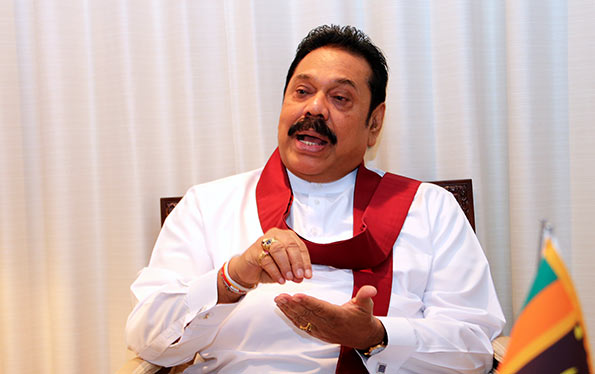Laying the groundwork to betray Sri Lankan armed forces personnel to foreign powers – Mahinda Rajapaksa

Former president Mahinda Rajapaksa says government has introduced a Bill to amend Act No: 25 of 2002 which represents Mutual Assistance in Criminal Matters.
Full Media Release:
The government has introduced in Parliament, a Bill to amend the Mutual Assistance in Criminal Matters Act, No. 25 of 2002. The purpose of the original law was to facilitate cooperation between Sri Lanka and specified foreign countries in locating and identifying witnesses or suspects, the service of documents on such persons, the examination of witnesses, the obtaining of evidence, execution of requests for search and seizure, temporarily transferring a person in custody to appear as a witness, facilitation of the personal appearance of witnesses, the location of the proceeds of any criminal activity, and enforcing orders for the freezing of property etc. It applied only to specified Commonwealth countries and to other countries that had signed agreements with Sri Lanka to render mutual assistance in criminal matters.
The Bill to amend Act No: 25 of 2002 will repeal and replace entire sections of the original Act and substantially change its character. The proposed amendment will widen the applicability of the Act to every country that is a party to any international Convention that involves criminal matters. Though the original Act applied only to states, the proposed amendment will make it applicable to international organisations such as the International Criminal Court as well. It will also make documentary evidence and evidence obtained through video conferencing from persons resident in foreign countries admissible in judicial proceedings. The administrative machinery to respond expeditiously to requests from overseas is also to be expanded.
The proposed legislation complements two previous laws introduced by the present government – the Office of Missing Persons Act and the Act relating to the International Convention on Enforced Disappearances. The Office of Missing Persons is a tribunal which can examine witnesses, issue summons and hold hearings. Its officers can enter without warrant at any time of day or night, any police station, prison or military installation and seize any document or object they require for investigations. Anyone who fails or refuses to cooperate with the OMP may be punished for contempt of court. Government bodies at all levels including the armed forces and intelligence services are mandatorily required to render fullest assistance to the OMP and the provisions of the Official Secrets Act will not apply to investigations carried out by this body.
The International Convention against Enforced Disappearances which has been incorporated into the law of Sri Lanka through Act No: 5 of 2018, confers jurisdiction over offences related to enforced disappearances on all the signatories to the international Convention so that an offence committed in Sri Lanka can be tried in a foreign country as if it was an offence committed in that country. Under Articles 10, 11 and 13 of the international Convention Sri Lankans can be arrested in foreign countries and either tried in the country that makes the arrest or handed over to the International Criminal Court. Under Sections 8 and 21 of Sri Lanka’s Act No: 5 of 2018, foreign states can request the extradition of persons suspected of having committed enforced disappearances in Sri Lanka to stand trial overseas.
The Bill to amend the Mutual Assistance in Criminal Matters Act, No. 25 of 2002 complements Act No: 5 of 2018 because it would not be possible to prosecute Sri Lankans in foreign courts for offences allegedly committed in Sri Lanka unless there was a mechanism to obtain evidence from Sri Lanka. The amendments proposed to the Mutual Assistance in Criminal Matters Act of 2002 are clearly aimed at assisting foreign courts in the trial of Sri Lankans for offences allegedly committed in Sri Lanka. This is the latest betrayal by the yahapalana government. The manner in which this government has been implementing the demands of their foreign patrons should also be taken note of by the public. In August 2016, the government forcibly passed the Office of Missing Persons Bill after giving Parliament less than 40 minutes to debate it. The better part of that time was spent in arguing whether that that Bill should be taken up for debate at all because the government had pledged not to take it up on that day.
In March 2018, the government passed the Prevention of Enforced Disappearances Act No: 5 when the attention of the whole nation was focused on the Sinhala-Muslim riots that broke out in the Kandy district. They passed this law despite repeated requests from the Mahanayaka Theras and the Karaka Sangha Sabhas of all three nikayas to jettison it. On May 18 this year, on the very anniversary of the victory against the LTTE, the government gazetted the Bill to amend the Mutual Assistance in Criminal Matters Act of 2002 at a moment when the people were preoccupied with the floods that affected many parts of the country. This country has had its share of traitors in its long history, but never anyone as committed and enthusiastic in their betrayal as the present government.
Mahinda Rajapaksa
Former President of Sri Lanka
Latest Headlines in Sri Lanka
- Sri Lanka to operate immigration department 24/7 to speed up passport issuance February 5, 2025
- Sri Lanka announces new paddy purchase prices from February 6, 2025 February 5, 2025
- Sri Lanka launches national survey on toque macaque February 5, 2025
- Sri Lankan MPs’ meal price jumps over four times from Rs. 450 to Rs. 2,000 February 5, 2025
- Sri Lanka to cut water tariffs by up to 30% February 5, 2025



look who is talking